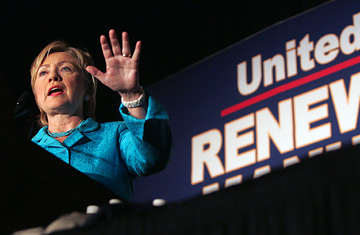
Democratic presidential candidate Sen. Hillary Clinton
At a campaign rally in Des Moines last week, Hillary Clinton ended her remarks with a poignant story, first told to her by then United Nations Ambassador Madeleine Albright. As Clinton recounted it, Albright, who was born in Czechoslovakia, was traveling in Europe for the 50th anniversary celebration marking the end of World War II:
"As [Albright] traveled around going from event to event, she kept seeing American flags everywhere. But when she looked more closely, she realized they had only 48 stars. And she asked people, where did this flag come from? And everyone told her the same thing. When the American GIs liberated Europe, they passed out these flags. Because remember, back then, Alaska and Hawaii weren't states yet. And Madeleine said, "But you could have gotten into trouble having these flags." And people said, "They were like treasures. We passed them down from grandparent to parent to child and, yes, if the Soviets had known we had them, we could have gotten into trouble but we would never let them go." And when Madeleine asked why they would keep these flags for 50 years, people said, "Because we love America and we love America's values." I want to be the President who restores that feeling about us around the world and equally importantly, I want us to feel that way about ourselves again."
The Czechs and their 48-star flags have become Clinton staples. She trotted them out in a speech about government reform in New Hampshire on April 13 (albeit with a different "down ramp": not about restoring America's role in the world, but about not "giv[ing] up on America's ideals") and has mentioned them at least five times since then. The anecdote also made a brief appearance in Clinton's autobiography, Living History.
You can't blame Clinton for reusing such a powerful story to end her speeches. In speechmaking, if something works, you use it and use it and use it again. (Robert Kennedy so frequently ended his 1968 campaign speeches with his paraphrase of the George Bernard Shaw line, "Some men see things as they are, and ask why. I dream of things that never were, and ask why not," that reporters covering his campaign used it as a cue to head for the buses. A fact RFK himself noted by one day just replacing the quote with "Run for the buses.")
But either by coincidence or convergence, Senator Clinton's story bears a remarkable similarity to one frequently told by Al Gore. In Gore's tale — the version below is from a September 8, 1999 address to the American Legion (full disclosure: neither of us remembers working on the speech, but we remember the story] — there was no triumphant Albright returning to her homeland, just a man from Murfreesboro, Tennessee, visiting his Senator.
As Gore told it, a man knocked on his Senate office door one day and told him how he had arrived in America after fleeing communist rule in Czechoslovokia. Years later, he and his wife went back to visit his hometown, newly liberated from communist rule, and they were stunned to see American flags everywhere:
"He couldn't understand it until he looked a little more closely at the flags and realized that each one of them had 48 stars on them, because the townspeople had kept them hidden underneath the beds and in the cupboards for 45 years — waiting until the day that they could be free — and celebrate the ideas and values and principles for which that flag and for which the United States of America stands."
Maybe 48-star American flags are to Czech homes what lava lamps are to college dorm rooms. But assuming that this is more than a coincidence, which story came first?
Clinton first used it in an address at the Radio Free Europe/Radio Liberty headquarters in Prague on July 4, 1996. The kicker then wasn't a call to restore American greatness abroad, but to safeguard hard-won freedoms from the Soviet incursion. "Freedom has come, and now it is up to each of us to determine what freedom will mean," she told the crowd in Prague.
Gore backdates his story to at least a decade before his 1999 telling, making it a full six years older than Albright's trip to Czechoslovakia.
There's nothing particularly scandalous about this. Working in the Senate and the White House, we've seen elected officials (and their staff members) hear stories, mash them up, and make them their own. At least in this case, Clinton and Gore wisely credit their stories to sources that protect them: Clinton because her source is unimpeachable, Gore because his is untraceable.
Of course, there's another possible explanation: maybe Madeleine Albright is from Murfreesboro.
Kenneth Baer is co-editor of Democracy: A Journal of Ideas. Jeff Nussbaum is a principal of the communications firm West Wing Writers. Both were speechwriters for Vice President Al Gore.
